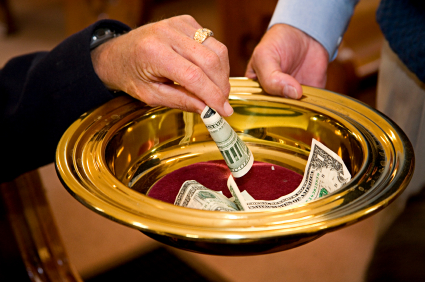
As the 2012 campaigns are under way, we sociologists are paying close attention to the rhetoric and public responses to the rhetoric. Of particular note are the religious overtones in that rhetoric as the most likely Republican candidate (from what I can tell) is a religious minority (Mormon or Latter-Day Saints) and the Democratic candidate is still viewed as Muslim in some quarters (also a minority religious group). Recently Mitt Romney’s charitable donations were under question and as it turns out he gives a heckuva lotta dough to charity, somewhere on the order of $3 million LAST YEAR ALONE. As the New York Times article shows, that’s a whopping 13.8% of his income that went to charity. For his part, Barack Obama gave 14.2% of his income to charity, which amounts to about $245,000. Its a lot less than Romney’s donation but still, could you imagine letting go of that much money in your account?
This brings me to the bigger point. While these figures are mind-blowing in and of themselves, the more important figure in my opinion was the one for the median taxpayer: 2.1%, or less than $1000 last year. I could look on the bright side and say that this is better than not giving at all. And besides, a growing percentage of Americans are not religious any longer, and still others are only marginally active. So surely we’re asking too much of Americans to be charitable since we may just have a lot of debts we owe or we need to get that new product “everyone else has.”

But I think about how many Americans folks that are active Christians (the majority by a wide margin) who are not following the Christian principle of tithing. Tithing generally refers to the practice of giving a share of one’s goods to the priests in the ancient community of Israel, something that amounted to a tenth of one’s earnings or the equivalent. Jesus then re-emphasizes the aim of such giving by contrasting the charitable giving of the rich man at the temple and that of the poor widow. The former gives from the store of his wealth and the other gives out of her want. In short, we’re to give as we are able and to give wholeheartedly, with a perspective that the money we possess belongs to God and we are merely managers of it.
Full disclosure, I’m no theologian and don’t pretend to be. I am also not the best Christian role model I know. That said, a lot of American Christians don’t follow any rudimentary pattern of giving. This became evident to me a few years ago when I read Passing the Plate: Why American Christians Don’t Give Away More Money . Using surveys and interviews, and a review of statements by major denominations, sociologists Christian Smith, Michael Emerson and Patricia Snell unpack a bevy of astounding statistics and patterns of thought and action that may make some readers scratch their chins, and others cringe, and still others jump out of their seats and say “I knew it!” For starters, regular church attenders (those who report attending church twice a month or more) earned $2 trillion in 2005 (p.12). Smith et al. point out that after-tax tithing at 10% would have amounted to $46 billion per year (p.13), enough money to address a whole slew of needs facing millions both stateside and abroad (pp.13-18).
Here are a few more important findings: 20% of churchgoers give nothing. MOST American Christians give very little (and that’s adding up church and non-church giving) (pp.29-39). Further they state:
The top most generous 5 percent of givers contribute 59.6% of all dollars contributed.
– this is where Romney and Obama are. Further, among those who earned less than $10K in 2005, they gave 2.3% (about $230 on average) of their earnings to religious organizations that year, whereas those earning $70K or more gave a whopping 1.2% (at least $840) (p.44).
The task then is to unpack the reasons for not giving, explaining why the world’s richest Christians seem to give so little. Smith and colleagues conclude with some larger issues that play a strong role in how American Christians think about money and charitable giving. The usual suspects are listed here, a culture of consumerism, lack of trust, sheer ignorance (a lot of Christians actually don’t know of any teachings about stewardship of one’s money). The part that got me however was this:
…complicating all of these matters is the fact that nearly no American Christian seems to talk with anyone else about the question of voluntary financial giving. Money and income are sacred in America. (p.178)
As the authors point out, Americans seem very closed about matters of charitable giving but are otherwise quite open their lives. To some extent having public figures like our presidential candidates disclose their charitable giving might be more shocking to some than learning about their sex lives. And talking about one’s own charitable giving with a friend might similarly be more intimate than disclosing a family secret.
What do you think, are American Christians too private about their giving?











